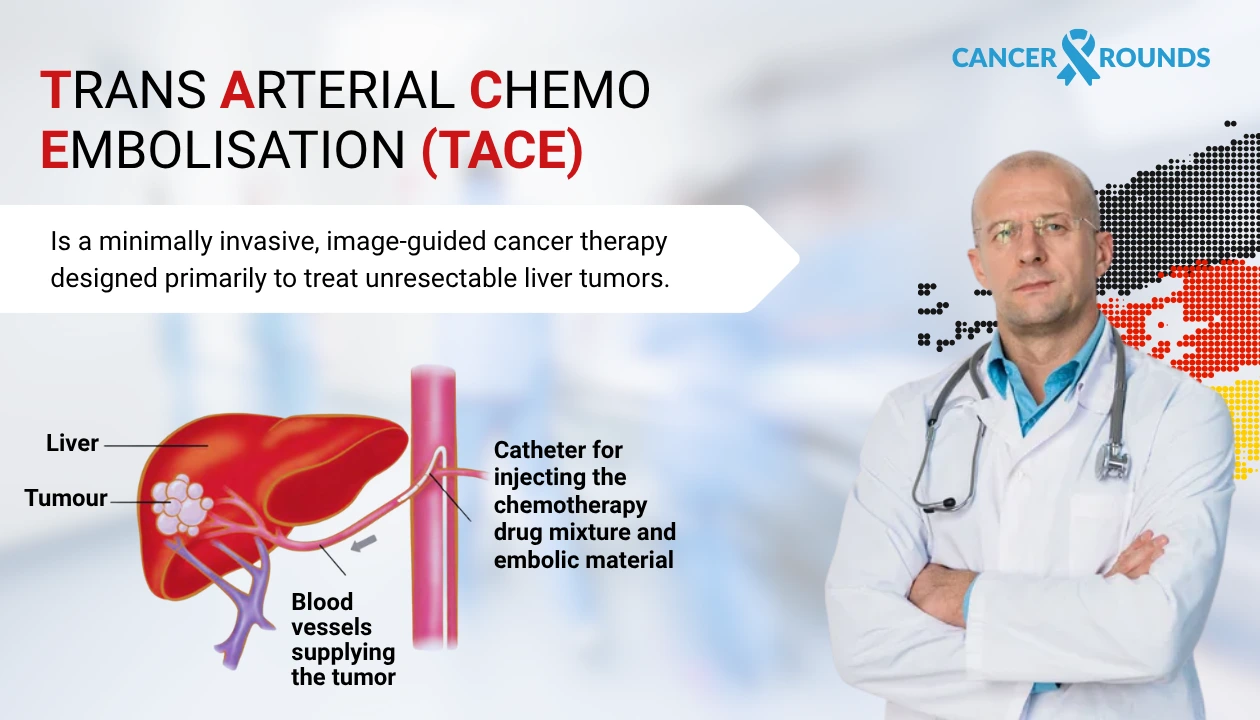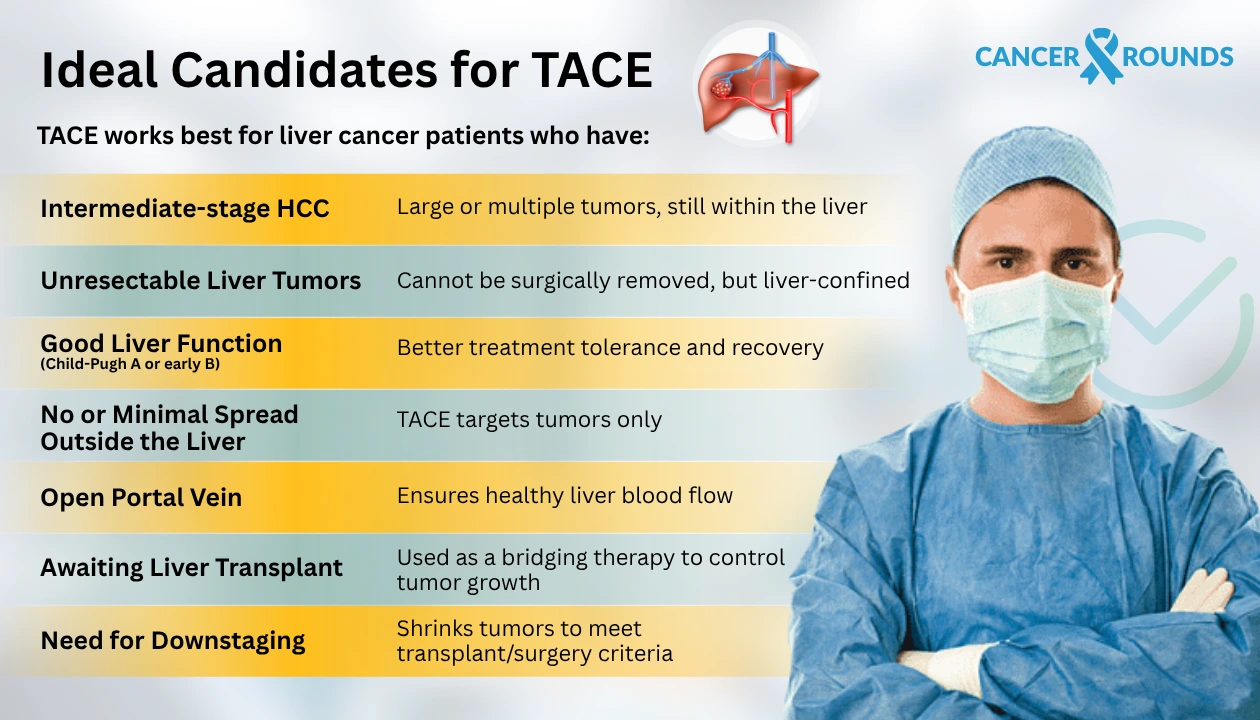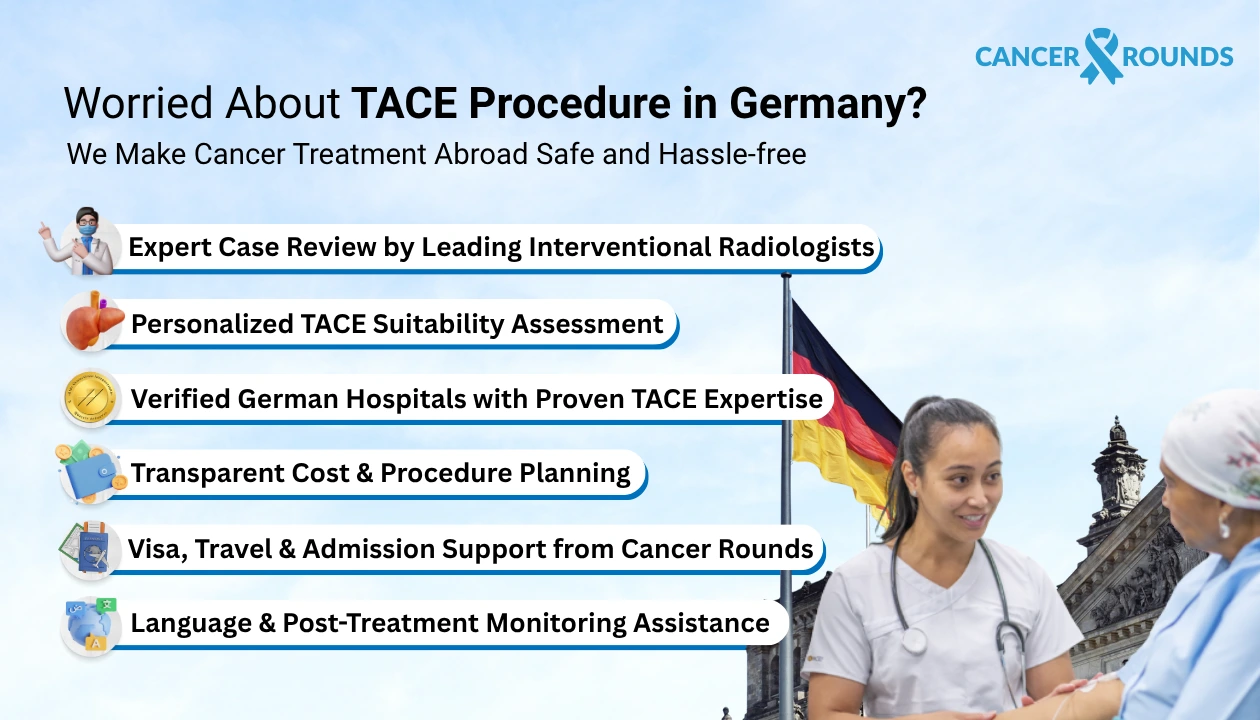Advanced TACE Cancer Treatment in Germany
Being diagnosed with an unresectable tumor—a tumor that cannot be removed through surgery—can be overwhelming. But a diagnosis is not a final verdict. In Germany, where medical innovation meets world-class care, patients are increasingly turning to a highly specialized, targeted therapy known as Transarterial Chemoembolization (TACE). TACE is a minimally invasive, image-guided procedure that delivers a high dose of chemotherapy directly into the arteries supplying the tumor. Once the drug is delivered, the artery is intentionally blocked (embolized), cutting off the tumor’s blood supply. This two-fold action—intense localized chemotherapy plus blood flow restriction—causes the tumor to shrink while minimizing systemic side effects.
This breakthrough approach is particularly beneficial in complex and late-stage cancers, where surgery is no longer viable. For instance, TACE for Unresectable Liver Metastases in Colon Cancer Patients has shown encouraging results, improving local tumor control and extending survival. Likewise, it is being used as an advanced treatment for non-resectable pancreatic cancer in Germany, offering symptomatic relief and potentially delaying disease progression.
Patients with metastatic breast cancer involving the liver are also finding new hope with TACE in Germany, as it provides a way to control liver lesions that do not respond to conventional chemotherapy. Even in aggressive systemic cancers, such as stage 4 lung cancer, specialists are evaluating the question: Is TACE a viable option in Germany?—and early findings suggest it may offer benefits in select, carefully screened patients.
Furthermore, emerging clinical applications now include TACE for unresectable kidney tumors and Transarterial Chemoembolization for recurrent ovarian cancer in Germany, especially when standard therapies have failed. German oncology centers are also pioneering combined TACE and immunotherapy protocols for metastatic gastric cancer, attempting to harness the synergy between localized and systemic treatments for more powerful outcomes.
Even rarer applications, like TACE for brain tumor metastases, are under investigation, illustrating how this technique is pushing boundaries in cancer care.
In essence, TACE is not just a treatment—it’s a precision-guided strategy tailored to those who need options beyond surgery or standard chemotherapy. Delivered by expert interventional radiologists within some of the most respected cancer centers in cities like Heidelberg, Berlin, Munich, and Hamburg, TACE in Germany represents both scientific advancement and a deeply human commitment to improving lives in the face of complex disease.
What Is TACE (Transarterial Chemoembolization)?
Transarterial Chemoembolization (TACE) is a minimally invasive, image-guided cancer therapy designed primarily to treat unresectable liver tumors, whether primary (like hepatocellular carcinoma) or metastatic (from colon, breast, pancreas, etc.). Germany has become a global hub for cutting-edge TACE, combining precision medicine with interventional radiology.

Mechanism of Action: How Does TACE Work?
TACE works by delivering chemotherapy directly into the tumor’s blood supply, followed by blocking that supply using embolic agents. This dual action:
- Bathes the tumor in a high concentration of anti-cancer drugs while sparing healthy tissues.
- Cuts off the tumor’s oxygen and nutrient supply, accelerating cancer cell death.
This targeted approach enhances local tumor control, slows disease progression, and can extend survival in patients not suitable for surgery.
How TACE Is Performed: Step-by-Step
- Imaging Guidance: Under fluoroscopic or CT guidance, a catheter is inserted into the femoral artery.
- Targeting the Tumor: The catheter is guided into the hepatic artery or any tumor-feeding artery.
- Drug Delivery: A chemotherapy drug (e.g., doxorubicin or cisplatin) is mixed with an oily contrast medium (like Lipiodol).
- Embolization: Tiny embolic particles (e.g., drug-eluting beads or microspheres) are injected to block blood flow.
- Monitoring: Imaging is done to ensure complete embolization.
The procedure typically takes 60–90 minutes and is done under local anesthesia with conscious sedation.
Advanced Innovations in TACE in Germany
Germany leads in next-generation TACE technologies, such as:
- DEB-TACE: Drug-eluting beads for slow, sustained chemotherapy release
- CT-Aided 3D Angiography: Improves targeting accuracy
- Radiopaque microspheres: Allow real-time visualization of embolization
- TACE + Immunotherapy: Trials underway combining local therapy with systemic checkpoint inhibitors
- Robotic Catheter Navigation: Emerging in tertiary centers
These advances have made TACE safer, more effective, and repeatable with improved patient quality of life.
Doctors Involved in TACE
TACE is typically performed and coordinated by a multidisciplinary tumor board involving:
| Specialist | Role |
| Interventional Radiologist | Performs the procedure using image-guided catheter techniques |
| Medical Oncologist | Assesses systemic treatment compatibility, patient suitability |
| Surgical Oncologist | Determines resectability, evaluates alternatives |
| Hepatologist / GI Oncologist | Focuses on liver function, cirrhosis, and cancer staging |
| Nuclear Medicine Specialist | May coordinate PET scans or radioembolization alternatives |
| Anesthesiologist | Provides sedation or pain management during and after the procedure |
In top German hospitals like Charité Berlin, Heidelberg Thoraxklinik, LMU Klinikum Munich, and UKE Hamburg, you’ll find some of Europe’s most experienced interventional teams specializing in liver-directed therapies.
Doctors For TACE Treatment
Need More Recommendations ?
Why Consider TACE in Germany?
Receiving a diagnosis of an unresectable tumor—one that cannot be surgically removed—can be emotionally devastating. However, a challenging diagnosis does not mark the end of treatment possibilities. In fact, in Germany, a country at the forefront of oncological innovation, patients are increasingly being offered renewed hope through a sophisticated, targeted intervention known as Transarterial Chemoembolization (TACE). TACE is a state-of-the-art, minimally invasive, image-guided therapy that allows oncologists to deliver potent chemotherapy agents directly into the arteries feeding the tumor, while simultaneously obstructing blood flow to the cancerous tissue. This dual mechanism—localized chemotherapeutic assault combined with vascular embolization—results in tumor necrosis, reducing tumor burden while sparing healthy surrounding tissue and significantly minimizing systemic toxicity.
This avant-garde technique has proven exceptionally promising in scenarios where surgical intervention is no longer an option. Among its most successful applications is TACE for Unresectable Liver Metastases in Colon Cancer Patients in Germany, where it has led to notable improvements in tumor control, symptom management, and overall survival. Similarly, TACE is being deployed as an advanced treatment for non-resectable pancreatic cancer in Germany, offering meaningful palliation and potentially slowing disease progression in otherwise refractory cases.
In women with metastatic breast cancer involving hepatic lesions, TACE in Germany is emerging as a pivotal tool—particularly when standard chemotherapy has failed to control liver metastases. The evolving role of TACE in stage 4 lung cancer is also being actively explored in leading German oncology centers. The question—“Is TACE a viable option for stage 4 lung cancer in Germany?”—is now being answered with cautious optimism, as selected patients demonstrate improved clinical outcomes under expert supervision.
How Germany Is Redefining Cancer Care with TACE: Beyond the Liver
While TACE was traditionally used for unresectable liver cancers, leading German cancer centers have expanded its role to include difficult-to-treat tumors across various organs. Here’s how:
1. Pushing Limits: TACE for Brain Tumor Metastases
- Though still investigational, select centers in Germany are exploring TACE for secondary brain tumors.
- The goal is to reduce tumor size or vascular supply in patients not fit for surgery or radiation.
- It’s part of a compassionate-use approach—giving hope where options are few.
2. Kidney Cancer Cases That Can’t Go to Surgery
- Nephrectomy (kidney removal) isn’t always possible—due to age, poor kidney function, or metastasis.
- In such patients, TACE helps slow tumor progression, relieve pain, and sometimes downstage the tumor.
- It offers a kidney-sparing alternative, especially when systemic drugs fail or aren’t tolerated.
3. Recurrent Ovarian Cancer: Giving Control Back
- TACE is being used to target pelvic or abdominal recurrences that are resistant to chemo.
- German centers apply precision catheterization, minimizing harm to healthy tissues.
- This can provide disease control or symptom relief in patients who’ve exhausted multiple treatments.
4. Metastatic Gastric Cancer: Power of TACE + Immunotherapy
- Germany is at the forefront of combining TACE with immunotherapy for advanced gastric cancer.
- This dual approach:
- Delivers chemo directly to the liver or metastatic sites
- Activates the immune system via checkpoint inhibitors (like anti-PD1 or anti-CTLA4)
- Early results suggest stronger tumor shrinkage and longer control periods.
5. Why Germany? The Clinical Edge
- Multidisciplinary teams (oncologists, radiologists, immunologists) customize TACE protocols per patient.
- Use of drug-eluting beads, 3D navigation, and post-procedure imaging improves outcomes.
- Patients benefit from personalized, non-surgical strategies that often reduce hospital stays.
Comparison Table: Organ-Wise TACE Innovations in Germany
| Cancer Type | Why TACE Is Used | German Innovation | Expected Benefit |
| Liver (Primary/Metastatic) | Standard indication; tumors ineligible for resection or systemic chemo | Drug-eluting beads, image-guided super-selective catheterization | Tumor shrinkage, local control, symptom relief |
| Kidney (Unresectable RCC) | For patients unfit for nephrectomy or with resistant metastatic disease | Tumor vascular mapping, renal-sparing delivery techniques | Slow progression, preserve kidney function |
| Ovarian (Recurrent, Platinum-resistant) | When IV chemo has failed or is no longer tolerated | Pelvic TACE with high-precision delivery | Delay progression, improve quality of life |
| Gastric (Liver Metastases) | In metastatic gastric cancer with liver involvement | TACE + checkpoint inhibitors (immunotherapy integration) | Enhanced immune response and tumor shrinkage |
| Brain Metastases | Palliative or experimental treatment for inaccessible or multiple metastases | Nano-bead chemoembolization under clinical research protocols | Experimental relief where other options fail |
5 easy Steps to Get Treated in Germany

Share Case Details

Get Expert Opinion and Hospital Quotes

Get Visa Invitation & Hotel Recommendations

Get Received At Airport and Start Your Treatment

Travel Back and Get Followups Through Us
Patient Perspective: Anika’s Journey with Recurrent Ovarian Cancer in Berlin
“After my third relapse, my oncologist in India said I’d reached the end of systemic options. I felt defeated—until I read about a center in Berlin offering TACE for ovarian recurrence.
The team there didn’t promise miracles—but they listened. They planned my treatment based on where the cancer was and how I felt, not just a textbook. I had two TACE sessions over four months. The pain went down. My CA-125 levels stabilized.
Today, I’m not cancer-free—but I feel in control again. And that means everything.”
Patient Perspective: Rajesh’s Battle with Liver Metastases and TACE Treatment in Berlin
“When my colon cancer spread to the liver, I was told surgery wasn’t possible. Chemotherapy helped, but only briefly. I needed another option—and fast. That’s when I learned about Transarterial Chemoembolization (TACE) being used for liver metastases in Berlin.
At first, I was skeptical. TACE was something I’d only heard about for liver cancer, not metastases. But the oncology team at the Berlin center evaluated my case with fresh eyes. They explained how TACE could directly target the tumors without overwhelming my whole body.
I underwent three TACE procedures over five months. Side effects were manageable—and for the first time in months, my scans showed stability. The liver pain eased. I could eat better, sleep better, think better.
I’m still in treatment, but I’m living again—not just surviving. For me, that’s a victory I didn’t expect.”
In conclusion, Transarterial Chemoembolization (TACE) cancer treatment in Germany is more than just a procedure—it is a precise, patient-tailored therapeutic platform that exemplifies the future of oncology: minimally invasive, highly focused, and strategically integrated. Administered by skilled interventional radiologists in world-renowned medical institutions across cities like Heidelberg, Berlin, Munich, and Hamburg, TACE in Germany embodies a fusion of technological sophistication and deeply personalized care.
For patients seeking effective, advanced cancer treatment options beyond surgery and systemic chemotherapy, TACE in Germany may very well represent the next chapter of hope and healing.
TACE Treatment Options in Germany by Cancer Type
| Cancer Type / Condition | TACE Application in Germany | Top Cities / Hospitals | Remarks |
| Colon Cancer with Liver Metastases | TACE for Unresectable Liver Metastases in Colon Cancer Patients in Germany | Heidelberg (Thoraxklinik), Munich (LMU Klinikum), Hamburg (UKE) | Improves liver lesion control and enhances survival in non-surgical patients. |
| Non-Resectable Pancreatic Cancer | Advanced Treatment for Non-Resectable Pancreatic Cancer in Germany | Berlin (Charité), Frankfurt (Uniklinik), Heidelberg | Palliative benefit with tumor size reduction and symptom relief. |
| Metastatic Breast Cancer with Liver Involvement | TACE for Metastatic Breast Cancer with Liver Involvement in Germany | Hamburg (UKE), Munich (Klinikum rechts der Isar) | Targets resistant hepatic lesions; may be used when systemic therapies fail. |
| Stage 4 Lung Cancer (selected patients) | TACE: A Viable Option for Stage 4 Lung Cancer? in Germany | Berlin (Charité), Heidelberg | Investigational but promising in carefully chosen cases with liver-dominant metastases. |
| Unresectable Kidney Tumors | TACE for Unresectable Kidney Tumors in Germany | Frankfurt (Goethe University Hospital), Dresden University Hospital | An option for patients unsuitable for nephrectomy or systemic therapy. |
| Recurrent Ovarian Cancer | Transarterial Chemoembolization for Recurrent Ovarian Cancer in Germany | Heidelberg, Berlin | Used in recurrent or platinum-resistant ovarian cancer with pelvic or liver involvement. |
| Metastatic Gastric (Stomach) Cancer | Combining TACE with Immunotherapy for Metastatic Gastric Cancer in Germany | Munich (LMU), Hamburg, Heidelberg | Ongoing trials combining local and systemic immunotherapy for enhanced effect. |
| Brain Tumor Metastases | TACE for Brain Tumor Metastases in Germany | Frankfurt, Charité Berlin | Rare usage; under evaluation for intracranial metastases in select tertiary care settings. |
Who Can Benefit from TACE?
TACE Treatment Pathways Across Germany: Precision Oncology for Inoperable and Metastatic Cancers-
Facing an unresectable or advanced-stage cancer can feel like the end of the road—but in Germany, it could be the beginning of a new therapeutic journey. Transarterial Chemoembolization (TACE) has emerged as a groundbreaking, minimally invasive treatment that targets tumors directly at their blood supply, offering renewed hope to patients for whom surgery and systemic therapies have reached their limits. From liver metastases in colon or breast cancer to non-resectable pancreatic, kidney, or ovarian tumors, and even select cases of stage 4 lung cancer and brain metastases, TACE is transforming the outlook for cancer care. Explore the table below to discover how Germany’s top oncology centers are pioneering tailored TACE applications by cancer type, hospital, and city—connecting innovation with compassionate care.
Cost of TACE in Germany
The financial investment for undergoing a Transarterial Chemoembolization TACE cancer treatment Cost in Germany typically falls within the range of €8,000 to €15,000 per session. This variation is influenced by several key factors, including the complexity of the case, the type and dosage of chemotherapeutic agents used, the choice of embolic materials, and the technological capabilities of the imaging systems involved.
Many leading oncology centers in Germany offer comprehensive TACE treatment packages, which may include thorough pre-procedure diagnostics (e.g., CT, MRI, angiography), inpatient hospital stay, post-procedural monitoring, and multidisciplinary follow-up consultations. Patients traveling internationally often benefit from bundled services that also cover interpreter support, case coordination, and discharge planning.
Packages may include:
- Diagnostic imaging (CT/MRI)
- Hospital stay (2–4 days)
- Anesthesia and nursing care
- Pre- and post-treatment evaluation
Insurance support or medical tourism facilitators like Cancer Rounds can streamline the process and reduce financial burden.
The Cancer Rounds team plays a pivotal role in coordinating and delivering personalized TACE treatment packages for patients seeking care in Germany. From the initial case review to connecting with top oncology centers, the team ensures a seamless journey—handling everything from medical documentation, appointment scheduling, and visa support to cost negotiation and post-treatment follow-up. By collaborating closely with leading hospitals, interventional radiologists, and international patient departments, Cancer Rounds provides not just logistical assistance but also compassionate guidance, helping patients and their families make informed decisions with clarity and confidence.
Leading Hospitals for TACE in Germany
Germany is home to some of Europe’s most advanced interventional oncology departments. The following Cancer Hospitals are internationally recognized for their expertise in delivering TACE for inoperable and metastatic cancers:
| Hospital Name | City | Clinical Specialization |
| University Hospital Heidelberg – Thorax Clinic | Heidelberg | Renowned for targeted therapies in liver, lung, and gastrointestinal tumors. |
| Charité – Universitätsmedizin Berlin | Berlin | One of Europe’s largest academic hospitals, excelling in complex interventional oncology. |
| LMU Klinikum | Munich | Known for integrated cancer care, clinical trials, and immunotherapy research. |
| University Medical Center Hamburg-Eppendorf (UKE) | Hamburg | Specializes in treating breast, colorectal, and ovarian cancer metastases. |
| Frankfurt University Hospital | Frankfurt | A key center for advanced management of pancreatic and renal malignancies. |
These institutions combine cutting-edge medical technology with personalized care protocols, making Germany a global destination for patients seeking innovative and effective TACE treatment.
Patient-Centered, International-Friendly Care- Most of these centers have dedicated international patient departments coordinated by the Cancer rounds team to help coordinate travel, accommodation, interpreters, and second opinions. You don’t need to navigate it alone.
Are International Patients Welcome for TACE in Germany?
Germany’s top oncology hospitals offer comprehensive care for international cancer patients, including:
- English-speaking coordinators
- Second opinion services
- Translators and visa support
- Customized treatment planning
Cancer Rounds acts as a bridge—handling everything from logistics to post-treatment coordination, ensuring that you’re in the safest and most compassionate hands abroad.
What’s Next?
If you or a loved one are looking into TACE in Germany, particularly for:
- Unresectable liver or kidney tumors
- Metastatic breast, colon, lung, or gastric cancer
- Recurrent ovarian cancer
- Brain metastases
… then you are not alone, and there are innovative options available.
Contact us today to connect with top hospitals and explore whether TACE is right for your cancer journey.
FAQs Related To TACE Procedure
Q.1 Who Can Benefit from TACE?
TACE (Transarterial Chemoembolization) is ideal for patients with unresectable tumors or those not responding to systemic therapy. It is particularly effective for:
- Liver metastases from colon, breast, or gastric cancers
- Primary liver cancer (HCC)
- Kidney, pancreatic, and ovarian tumors
- Selective lung and brain metastases
TACE works by delivering chemotherapy directly into the tumor-feeding artery while simultaneously blocking the blood supply, inducing tumor ischemia and necrosis.
Q.2 Is TACE for Unresectable Liver Metastases in Colon Cancer Patients in Germany possible?
In colon cancer patients with liver-limited metastases, TACE offers a local-regional therapy that bypasses systemic toxicity. It targets hepatic arteries feeding the tumor, sparing healthy parenchyma and extending survival. German centers like Heidelberg and LMU Munich are pioneers in this indication.
Q.3 What is Advanced Treatment for Non-Resectable Pancreatic Cancer in Germany?
Non-resectable pancreatic tumors, due to vascular invasion or distant spread, are managed with TACE as a palliative tool. By embolizing tumor vessels and delivering high local drug concentration (like irinotecan or gemcitabine), German institutions like Charité and Frankfurt University have reported improvements in pain control, tumor shrinkage, and progression-free survival.
Q.4 Can TACE for Metastatic Breast Cancer with Liver Involvement be done successfully in Germany?
For hormone-refractory or HER2-positive metastatic breast cancer with dominant liver lesions, TACE is an emerging option when systemic therapy plateaus. Top German hospitals like UKE Hamburg use doxorubicin-laden beads to prolong hepatic disease control and maintain quality of life.
Q.5 Is TACE A Viable Option for Stage 4 Lung Cancer in Germany ?
Although not routine, TACE for Stage 4 lung cancer is being explored in Germany for patients with oligometastatic or liver-dominant spread. By selectively targeting metastatic nodules, particularly in EGFR- or ALK-mutated NSCLC, German experts are studying how TACE could delay systemic resistance and improve survival.
Q.6 Is TACE successfully performed for unresectable kidney tumors in Germany?
Patients with large, inoperable renal cell carcinoma (RCC) or poor surgical fitness may benefit from TACE to reduce tumor burden, control hematuria, and alleviate compression symptoms. German centers like Frankfurt and Dresden use cisplatin or lipiodol-based regimens tailored to tumor vascularity.
Q. 7 Does Transarterial Chemoembolization for Recurrent Ovarian Cancer in Germany have any ongoing clinical trials?
In platinum-resistant or recurrent ovarian cancer with pelvic/liver involvement, TACE is a viable adjunct. By exploiting the rich vascular supply to pelvic tumors, this method provides regional control and symptom relief, particularly when surgery or systemic options are exhausted. Heidelberg and Berlin hospitals are involved in ongoing clinical trials.
Q.8 Combining TACE with Immunotherapy for Metastatic Gastric Cancer in Germany gives a good innovative protocol; is it true?
Germany is at the forefront of combination therapy, using TACE plus checkpoint inhibitors for metastatic gastric cancer. This dual strategy aims to debulk hepatic lesions while stimulating systemic immune response—enhancing antigen presentation and tumor infiltration. Munich’s LMU Klinikum leads several of these innovative protocols.
Q.9 Is TACE for brain tumor metastases being explored in Germany?
Though less common, TACE is under evaluation for brain tumor metastases in German tertiary centers. Select cases of highly vascular metastases (e.g., melanoma or renal origin) may benefit from arterial embolization techniques to reduce intracranial pressure and bleeding risk. Charité Berlin and Frankfurt are exploring this approach in controlled trials.
Are you or your loved one Ready to Explore TACE for Advanced Cancer?
If you’ve been told your tumor is unresectable, don’t give up hope. TACE in Germany might be the game-changing solution you need. Get in touch with Cancer Rounds today to review your case, compare hospital options, and begin your journey toward better, smarter cancer care—personalized for you.
You May Be Also Interested In
All Treatment Pages
Related Patient Stories

I’m so glad I reached out to Cancer Rounds. They made my liver transplant journey smooth—from travel to treatment.
Our Impact
CancerRounds is making quality cancer care accessible to more people every day.




Why Choose India for Cancer Treatment?

World-Class Care
Skilled oncologists provide top-tier medical services

Affordable Treatment
Costs are significantly lower than in Western countries.

Comprehensive Packages
Hospitals offer all-inclusive plans covering surgery, stay, and aftercare.

Easy Accessibility
Well-connected airports and international flight routes.

Proven Success
High patient satisfaction and positive treatment outcomes
Thank You!
Your form has been submitted successfully.






 Chat on WhatsApp
Chat on WhatsApp